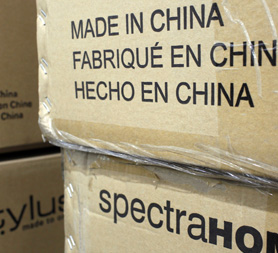Will US threats of trade action against China backfire?
A group of senators say Chinese currency “manipulation” is damaging the US economy – and they want Congress to take action against China. But opponents say any such move would backfire.

“We are fed up with your intransigence on currency manipulation. If you refuse to play by the same rules, we will force you do so.” That is the message that Democratic senator Charles Schumer has for Chinese President Hu, and one he wants President Obama to take on board. Schumer is part of a group of senators who want Congress to pass legislation to protect the US from what he sees as the artificially devalued Chinese currency. He added: “There’s no bigger step we can take to preserve the American dream and promote job creation, particularly in the manufacturing sector.”
Entwined economies
But while the senators pile pressure on President Obama, he faces a competing demand to cooperate with China. That is a demand created by the entwined nature of the US and Chinese economies, mainly the fact that America owes China nearly one trillion dollars. In order to raise money and plug the country’s deficit the United States treasury sells bonds. The biggest foreign buyer of this debt is China.
This is one of the ways that opponents of China’s currency strategy believe it is artificially keeping the renminbi low compared to the dollar. As dollars pour into China through trade with the US, they are swapped by the central bank for renminbi and invested back into the US through bonds.
By keeping dollars off the market, China can keep their price high and the renminbi low, although in an interview with the Washington Post, President Hu argued that changes in exchange rate are the result of multiple factors.
Both the Senate and the House would have to approve any bill proposing action against China and Obama would have to sign it, for it to become law.
John Frisbie, president of the US-China Business Council, warned that passing currency legislation would be likely to backfire by inflaming relations and opening the door to retaliation:”It’s counterproductive. It wouldn’t help to get to the goal of a market-orientated exchange rate.” He said he hoped the two presidents would send a strong message against protectionism and the importance of maintaining open trade and investment flows?
Secretary of State Hillary Clinton added her endorsement of a cooperative relationship on Wednesday, saying: “We want to look for as many win-win opportunities as we can because this relationship is going to in many ways determine the peace, stability and prosperity of the 21st century.”
But while relations have so far been diplomatic, an unemployment figure of 10 per cent in America, compared to only 4 per cent in China is leading Americans to think they are getting a raw deal. President Obama will have to tread a fine line, as the two economies become ever further entwined.